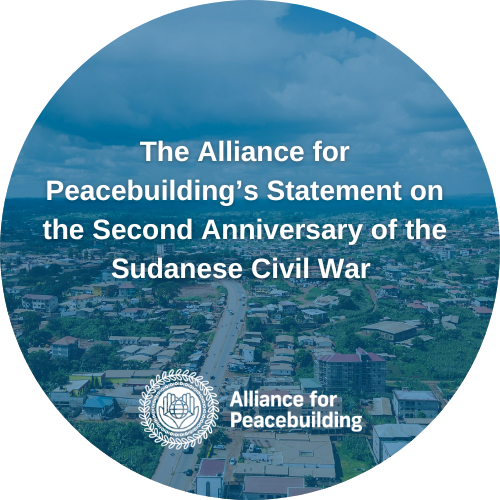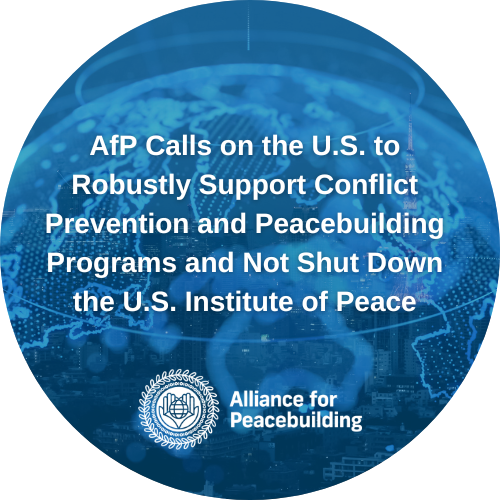This assessment explores risks of mass atrocities in South Sudan due to increasing violence, the detention of senior officials, lagging progress in the implementation of the Revitalized Agreement on the Resolution of the Conflict in South Sudan (R-ARCSS) of 2018, and regional spillover from the violent conflict in Sudan. Compounding these drastically deteriorating conditions, South Sudan’s first elections since independence, originally scheduled for December 2024, have been postponed until December 2026. This assessment identifies plausible atrocity scenarios, key indicators to monitor, and recommended prevention and response options for the United States Government and the international community.
Read MoreThe Alliance for Peacebuilding (AfP), a network of 235+ organizations working to prevent violent conflict and build sustainable peace in 181 countries, recognizes that these are extraordinary times with significant cuts to U.S. foreign aid. AfP has long been a proponent of reforming diplomacy and foreign assistance, and championed major innovations through laws such as the Global Fragility Act (GFA). In rebuilding the U.S. foreign policy and assistance aperture, Congress must advance reform-focused laws that prioritize and integrate conflict prevention and peacebuilding, like the GFA, become centered to ensure the U.S. is safer, stronger, and more prosperous. We urge the 119th Congress to robustly fund, champion, and provide oversight of key peacebuilding and prevention laws and accounts and ensure conflict prevention expertise is retained at the Department of State.
Read MoreOn May 15th, PPWG AfP sent a letter from the Prevention and Protection Working Group (PPWG) to Secretary of State Marco Rubio urging him to prioritize atrocity prevention during the reorganization of the Department. At a time of record-breaking levels of violent conflict and rising mass atrocities, the proposed reorganization of the Department concerningly eliminates or downsizes several key offices and bureaus that are central to the successful implementation of the Elie Wiesel Genocide and Atrocities Prevention Act (EWGAPA), which Secretary Rubio co-sponsored and President Trump signed into law. Dismantling or deprioritizing the atrocities prevention and accountability offices and bureaus and terminating their experts will dramatically undermine the ability of the U.S. Government to implement EWGAPA and effectively respond to destabilizing mass atrocities and grave human rights abuses globally.
Read MoreOn April 30th, in light of the proposed reorganization of the State Department by the Trump Administration, AfP sent a letter signed by 24 other organizations to Secretary of State Marco Rubio urging him to retain conflict experts, ensure a clear and dedicated entity charged with implementing key prevention laws, and robustly integrate conflict prevention and peacebuilding throughout all assistance and diplomacy in conflict-affected and fragile states.
Read MoreThe American University Conflict Mitigation and Peacebuilding Practicum team partnered with Alliance for Peacebuilding (AfP) to explore the challenges of measuring progress in the attainment of Sustainable Development Goal 16 (SDG 16) and potential lessons for the design of the 2030 Agenda for Sustainable Development.
Read More







